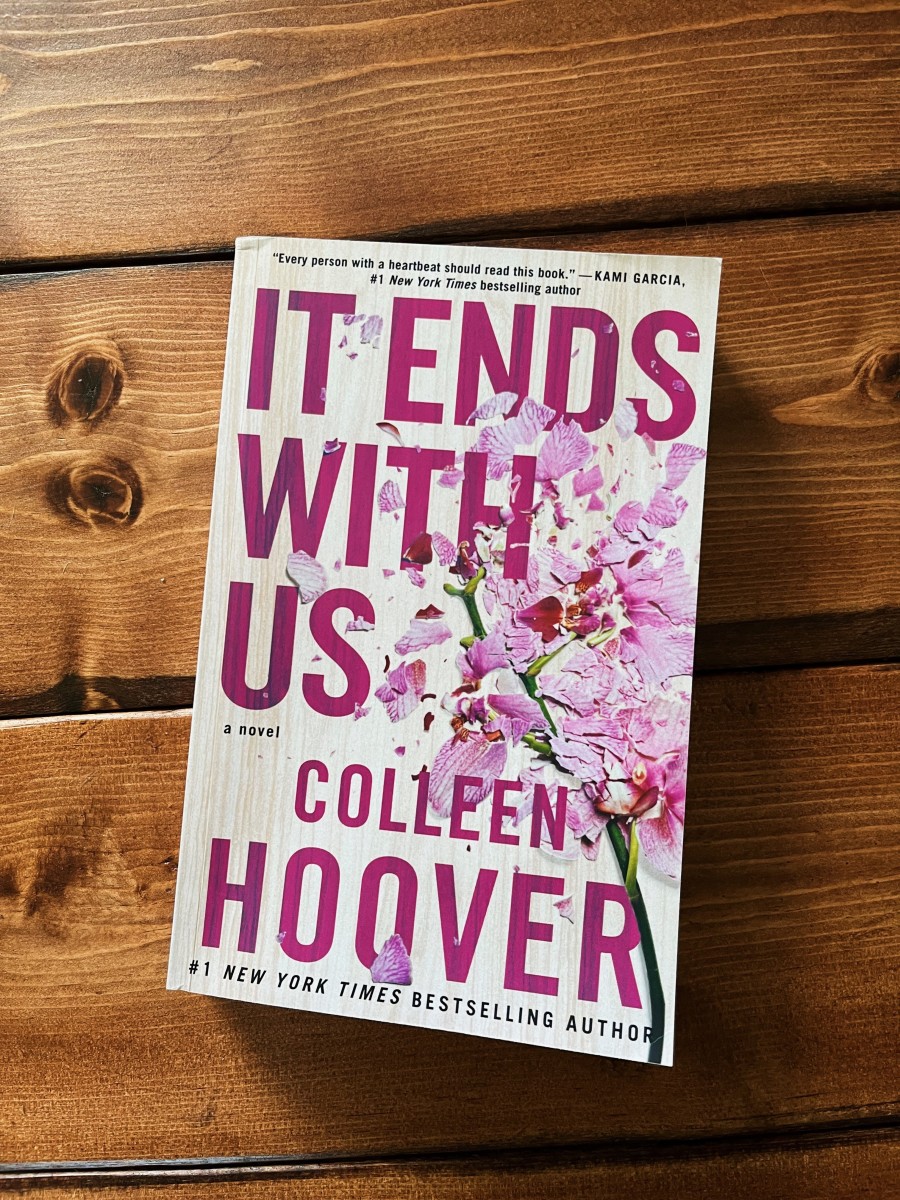It Ends With Us: A Review Through the Lens of the 1960s
Related Articles: It Ends With Us: A Review Through the Lens of the 1960s
Introduction
With great pleasure, we will explore the intriguing topic related to It Ends With Us: A Review Through the Lens of the 1960s. Let’s weave interesting information and offer fresh perspectives to the readers.
Table of Content
It Ends With Us: A Review Through the Lens of the 1960s

Colleen Hoover’s It Ends With Us has captivated readers worldwide with its exploration of love, loss, and the enduring impact of trauma. While the novel is set in the present day, its themes resonate deeply with the complexities of the 1960s, a decade marked by societal upheaval, evolving gender roles, and a growing awareness of domestic violence. Examining It Ends With Us through this lens provides a unique perspective on the novel’s timeless appeal and its relevance to contemporary conversations about relationships and abuse.
The Echoes of the Past:
The 1960s witnessed a seismic shift in societal norms. The feminist movement gained momentum, challenging traditional gender roles and advocating for women’s rights. The Civil Rights Movement fought for equality and justice, while the Vietnam War sparked widespread anti-war protests. This era of social and political change also brought a greater focus on mental health, as the stigma surrounding mental illness began to erode.
It Ends With Us echoes these themes through its characters, particularly Lily, a young woman navigating the complexities of love and self-discovery. Her journey reflects the changing expectations of women during this era, as she struggles to reconcile her desire for independence with societal pressures to conform to traditional gender roles. Lily’s experiences with domestic violence mirror the growing awareness of this issue in the 1960s, as women’s voices began to be heard more prominently in discussions about abuse.
The Power of Silence:
One of the most striking aspects of It Ends With Us is the way it portrays the impact of silence and secrecy on victims of abuse. Lily’s initial reluctance to speak out about her experiences reflects the societal pressures of the time, where women were often discouraged from disclosing abuse for fear of shame or judgment.
The 1960s saw the rise of support groups and organizations dedicated to helping victims of domestic violence, but these resources were still relatively limited. The novel underscores the importance of breaking the silence surrounding abuse and seeking help, a message that remains relevant today.
The Legacy of Trauma:
It Ends With Us explores the long-lasting effects of trauma on individuals and relationships. Lily’s experiences with abuse shape her perceptions of love and intimacy, leading to a cycle of self-doubt and fear. The novel highlights the importance of addressing past trauma in order to heal and move forward in a healthy way.
The 1960s saw a growing understanding of the psychological impact of trauma, as researchers and therapists began to explore the long-term consequences of abuse and neglect. This increased awareness paved the way for the development of therapeutic interventions aimed at helping individuals cope with trauma and build resilience.
The Search for Healing:
Throughout the novel, Lily embarks on a journey of self-discovery and healing. She seeks support from friends, family, and professionals, ultimately finding strength in her own resilience. This journey resonates with the spirit of the 1960s, a decade that emphasized personal growth and self-actualization.
The 1960s saw a surge in interest in self-help and personal development, as individuals sought to find meaning and purpose in a rapidly changing world. The novel’s focus on Lily’s journey of healing reflects this broader cultural shift towards personal growth and empowerment.
Related Searches
Here are some related searches that offer further insights into It Ends With Us and its connections to the 1960s:
- Domestic violence in the 1960s: Researching the history of domestic violence in the 1960s reveals the social and cultural context surrounding abuse during that time. It highlights the evolving understanding of domestic violence as a societal issue and the emergence of support organizations for victims.
- Feminist movement and domestic violence: The feminist movement played a crucial role in raising awareness of domestic violence and challenging societal norms that perpetuated abuse. Examining the intersection of these movements sheds light on the historical context of the novel’s themes.
- Mental health in the 1960s: Exploring the evolution of mental health awareness and treatment during the 1960s provides context for Lily’s struggles with trauma and her journey towards healing.
- The impact of trauma on relationships: Understanding the long-term effects of trauma on relationships helps to contextualize Lily’s complex dynamics with Ryle and Atlas.
- Colleen Hoover’s writing style: Analyzing Colleen Hoover’s writing style reveals her ability to create relatable characters and compelling narratives that resonate with readers on an emotional level.
- Themes of love and loss in It Ends With Us: Examining the themes of love and loss in the novel highlights the complexities of human relationships and the enduring impact of heartbreak.
- The role of family in It Ends With Us: Analyzing the influence of family dynamics on Lily’s decisions and experiences reveals the importance of support and understanding in navigating challenging relationships.
- The importance of seeking help: Understanding the significance of seeking help for abuse and trauma is crucial for readers to grasp the message of hope and resilience conveyed in the novel.
FAQs
Q: How does It Ends With Us reflect the changing gender roles of the 1960s?
A: Lily’s struggle to balance her desire for independence with societal pressures to conform to traditional gender roles mirrors the changing expectations of women during the 1960s. The novel explores the challenges faced by women as they sought to break free from traditional roles and assert their agency.
Q: What are the historical connections between the novel’s themes and the rise of the feminist movement?
A: The feminist movement played a significant role in raising awareness of domestic violence and challenging societal norms that perpetuated abuse. Lily’s experiences with abuse and her journey towards empowerment reflect the broader societal changes driven by the feminist movement.
Q: How does It Ends With Us address the issue of silence and secrecy surrounding abuse?
A: The novel highlights the impact of silence and secrecy on victims of abuse, reflecting the societal pressures of the time that discouraged women from speaking out about their experiences. Lily’s initial reluctance to disclose her abuse underscores the importance of breaking the silence and seeking help.
Q: What are the implications of examining It Ends With Us through the lens of the 1960s?
A: Examining the novel through the lens of the 1960s provides a deeper understanding of its themes and their historical context. It highlights the enduring impact of societal norms and the importance of challenging harmful beliefs and practices.
Tips for Reading It Ends With Us
- Consider the historical context: Understanding the social and cultural landscape of the 1960s can enhance your reading experience by providing a framework for interpreting the novel’s themes and characters.
- Reflect on the impact of trauma: Pay attention to how Lily’s experiences with abuse shape her perceptions of love and intimacy, and consider the long-lasting effects of trauma on individuals and relationships.
- Engage with the themes of healing and self-discovery: Reflect on Lily’s journey of self-discovery and healing as she seeks support and confronts her past trauma.
- Discuss the novel with others: Sharing your thoughts and interpretations with friends, family, or online communities can enrich your understanding of the novel and its themes.
Conclusion
It Ends With Us is a powerful and timely novel that resonates with readers across generations. Examining the novel through the lens of the 1960s provides a unique perspective on its themes of love, loss, and the enduring impact of trauma. By understanding the historical context surrounding these issues, readers can gain a deeper appreciation for the novel’s timeless appeal and its relevance to contemporary conversations about relationships and abuse.
The novel’s exploration of silence, secrecy, and the legacy of trauma highlights the importance of breaking the cycle of abuse and seeking help. It reminds us that healing is possible, and that finding our voice can be a powerful act of self-empowerment. It Ends With Us serves as a poignant reminder of the complexities of human relationships and the enduring power of hope and resilience.








Closure
Thus, we hope this article has provided valuable insights into It Ends With Us: A Review Through the Lens of the 1960s. We appreciate your attention to our article. See you in our next article!